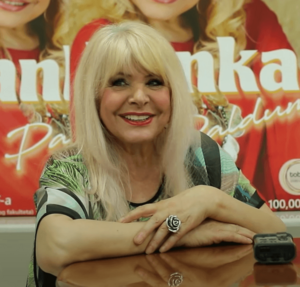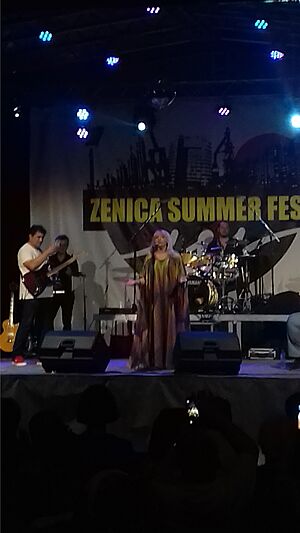Hanka Paldum facts for kids
Quick facts for kids
Hanka Paldum
|
|
|---|---|

Paldum in 2022
|
|
| Born | 28 April 1956 Čajniče, PR Bosnia and Herzegovina, FPR Yugoslavia
|
| Occupation |
|
| Years active | 1972–present |
| Musical career | |
| Genres |
|
| Labels |
|
| Associated acts |
|
Hanka Paldum (born April 28, 1956) is a famous Bosnian singer. She is known for singing sevdalinka, a traditional type of folk music from Bosnia. She also helped start the record label Sarajevo Disk. Many people think she is one of the best sevdah singers of the 20th century. She is very popular in her home country of Bosnia and Herzegovina and other countries that were once part of Yugoslavia.
Contents
Biography
Early Life and Musical Beginnings
Hanka Paldum was born in the town of Čajniče in eastern Bosnia. Her parents were Mujo and Pemba, and she had five siblings. When Hanka was seven, her family moved to Sarajevo.
She started singing in her school choir in the first grade. She loved to sing, even when she was shy. She once said, "We went by train to my aunt's home... There were a lot of tunnels and when the train entered a tunnel, I would sing, and when it come out of the tunnel I stopped, because I was shy.”
When she was twelve, her brother encouraged her to sing at local events. She often won amateur singing contests. Her prize was usually chocolate or movie tickets. After her father saw how much she loved music, he allowed her to enroll in a music school.
Career Beginnings
Hanka passed an audition for Radio Sarajevo and began taking voice lessons. She made her first recordings for the radio, which were traditional sevdalinka songs. Her first official release was an extended play (EP) in 1973.
In 1975, she won a singing festival called "Pjevamo danu mladosti" (Sing for the Youth Day). She then recorded the song "Voljela sam oči zelene" (I Loved Green Eyes), which became a huge hit. This song was her signature song for a long time. After this success, she performed at the famous Ilidža Festival with the song "Ja te pjesmom zovem" (I Call You with My Song), which also became very popular.
While in high school, she met Muradif Brkić, who later became her husband. They married after he graduated from university. Together, they had a daughter named Minela and a son named Mirzad.
Rise to Stardom
In 1979, Hanka, her husband, and a friend started a record company called Sarajevo Disk. They signed a rock musician named Milić Vukašinović. He wrote a song for Hanka called "Voljela sam, voljela" (I Loved, I Loved). The song was a massive success, selling over a million copies. This made Hanka famous across all of Yugoslavia.
Hanka's 1980 album, Čežnja (Yearning), mixed folk and rock music. At first, some music critics did not like this new style. But the public loved it, and the album sold over a million copies. It brought in many new fans who had not listened to folk music before.
She began to perform in large concert halls. Her 1982 album, Sanjam (I'm Dreaming), made her one of the biggest stars in Yugoslavia. The album was so popular that four different companies had to help make and sell the records to meet the demand.
A Yugoslavian Star
Throughout the 1980s, Hanka continued to release successful albums and hold sold-out concerts. In Belgrade, she held a record-breaking 14 concerts in just seven days. She won many awards, including "female artist of the year" several times.
She worked with famous songwriters and musicians. Her 1984 album, Tebi ljubavi (For You, My Love), was a huge success, with the hit song "Ali pamtim još" (But I Still Remember). In 1985, she recorded the album Nema kajanja (No Regrets) with the group Južni Vetar, which became one of the most successful albums of the year.
In 1991, she had a small role in the movie Praznik u Sarajevu (Holiday in Sarajevo).
During the war in Bosnia and Herzegovina from 1992 to 1995, Hanka stayed in the city of Sarajevo.
Later Career
After the war, Hanka continued her music career. In 1999, she released the album Nek’ je od srca (Let It Be From the Heart). It included the hit duet "Crni snijeg" (Black Snow) with Hari Varešanović, the singer of the band Hari Mata Hari.
In 2004, she celebrated 30 years of her career with a large concert in Sarajevo's Zetra Arena. Many famous singers were her guests. She released more successful albums, including Žena kao žena (A Woman Like a Woman) in 2006.
In 2013, she released a duet with Serbian singer Dragana Mirković called "Kad nas vide zagrljene" (When They See Us Embrace). The music video showed Hanka in Sarajevo and Dragana in Belgrade, meeting on the famous Stari Most bridge in Mostar. The song was seen as a message of friendship.
Hanka Paldum continues to perform and is a beloved singer in Bosnia and Herzegovina and beyond.
Discography
- Voljela sam oči nevjerne (1974)
- Srebro i zlato (1979)
- Sjajna zvijezdo (1980)
- Čežnja (1980)
- Sanjam (1982)
- Dobro došli prijatelji (1983)
- Tebi ljubavi (1984)
- Nema kajanja (1985)
- Bolno srce (1986)
- Gdje si dušo (1988)
- Kani suzo izdajice / Tako me uzbuđuješ (1989)
- Vjetrovi tuge (1990)
- Nek’ je od srca (1999)
- Džanum (2001)
- S' kim si – takav si (2003)
- Žena kao žena (2004)
- Što svaka žena sanja (2013)
Filmography
Film
- Praznik u Sarajevu (Holiday in Sarajevo, 1991)
Television
- Në orët e vona (At Late Hours, 1982)
- Nad lipom 35 (Under the Linden, 2006)
- Lud, zbunjen, normalan (Crazy, Confused, Normal, 2009–12); 2 episodes


